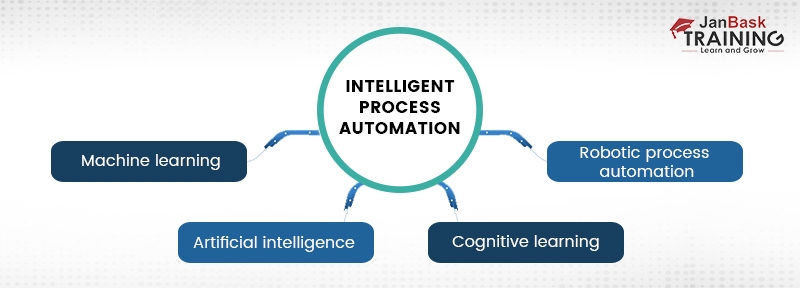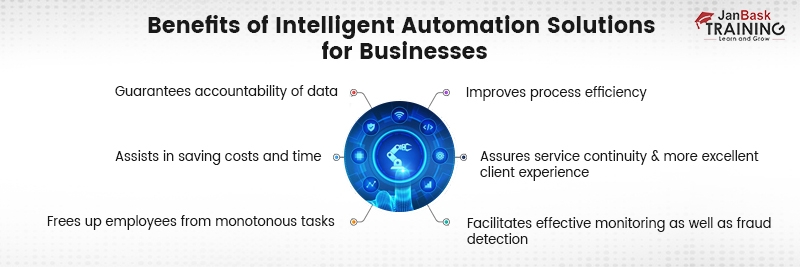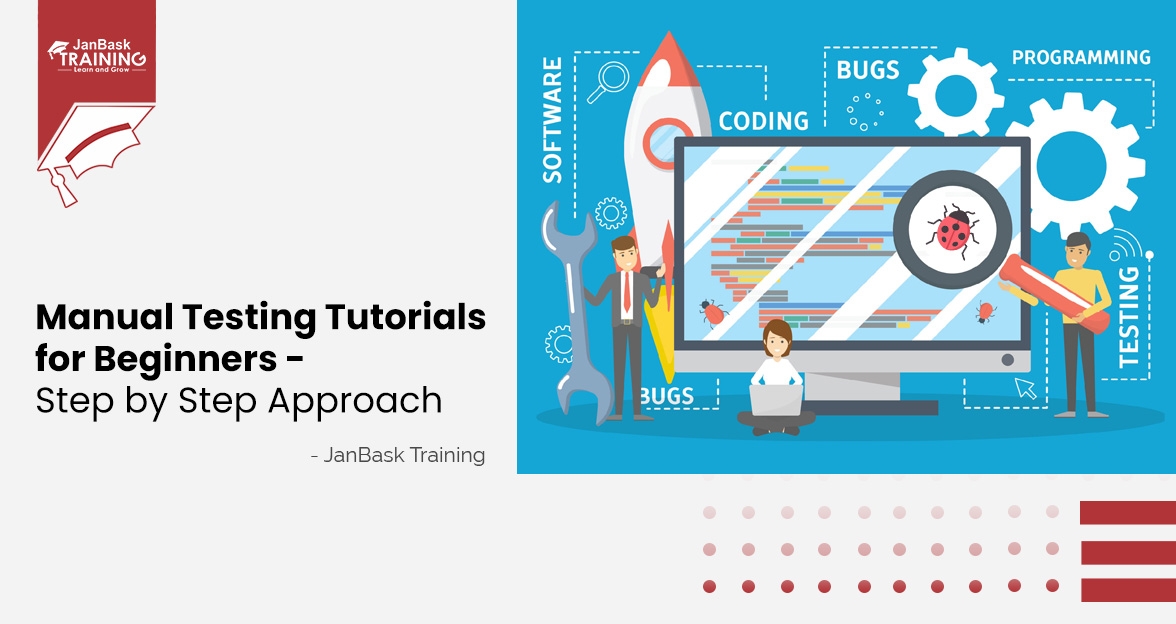Introduction
Gartner expects that by 2024, organizations will lower operational costs by 30% by combining hyper-automation technologies with redesigned operational processes.

Faster improvements in technologies and automation have created extensive advancements by integrating/collaborating both AI and automation, termed “Intelligent Automation.” This new technological advancement is solely the result of AI and automation combined with human intelligence. It’s now extensively used across all sectors, and its utilization will likely increase manifolds in upcoming years.
So without wasting time, let’s take a closer look at what intelligent automation is and what top intelligent automation trends and predictions to look forward to in 2023. But before diving into what businesses expect from intelligent automation, do you wish to learn how to analyze and visualize the data? Professional data science courses will help you. Let's first understand the meaning of intelligent automation.
Artificial Intelligence Certification Training
- Personalized Free Consultation
- Access to Our Learning Management System
- Access to Our Course Curriculum
- Be a Part of Our Free Demo Class
What is Intelligent Automation?
Intelligent automation definition-
It is also called “Cognitive Automation.” It is a fusion of leading-edge technologies such as Artificial Intelligence (AI), Business Process Management (BPM), and Robotic Process Automation (RPA). In addition to these technologies, Intelligent Automation also uses a few more intelligent technologies, such as Analytics, Optical Character Recognition (OCR), Intelligent Character Recognition (ICR), Machine Learning (ML), Deep Learning (DL), Natural Language Processing, Process Mining, etc. Conjointly, these technologies allow continued business automation, speed up digital transformation for companies, and simplify the decision-making process throughout the organization to boost operational capabilities.

As stated by AnalyticsInsight, “Using digital transformation, intelligent automation has acquired enormous importance mostly for process management to manage users, tasks, systems, and robots based on organizational requirements at every moment. Intelligent process automation considers using analytics and artificial intelligence, specifically machine learning, to make informed, automated, and brilliant decisions and handle cases to offer enough flexibility to the processes for the complete success of case management.”
AI online certified professionals comply with an array of practical and theoretical knowledge alongside a working understanding of their role-specific tools and processes, which helps in meeting business needs.
Components of Intelligent Automation
According to the intelligent automation definition, IA is composed of three comprehensive technologies, the integration of which creates a solution that empowers businesses and technological transformation.
1. Most vital component of intelligent automation (IA) is - AI, i.e., Artificial Intelligence. With machine learning and complicated algorithms to evaluate structured and unstructured data, enterprises can build a database and work out predictions based on that data. It's a decision engine of intelligent automation.

2. The second most crucial component is BPM, i.e., Business Process Management, also referred to as Business Workflow Automation. It automates business workflows to offer better agility and consistency to the processes. It is utilized by several organizations to simplify processes and boost communications and user engagement.
3. The third essential component is RPA, i.e., Robotic Process Automation, which uses software robots, or bots, to do back office activities like data extraction or form filling. These robots or bots are accompanied by AI and RPA, which leverage artificial intelligence insights to manage complicated activities and use cases.
The combination of these IA components develops an impactful solution that simplifies business processes as well as workflows to enhance UX finally.
Intelligent Automation Examples
As discussed in the intelligent automation definition, it’s the next gen of RPA technology that leverages artificial intelligence to automatize complicated tasks with unstructured data. Below we’re discussing AI automation examples.

1. Intelligent capture
It is the backbone of intelligent process automation that not only catches data that can be unstructured, such as handwriting but also recognizes and categorizes the data.
A compelling, intelligent capture solution would
- Categorize, extract and authenticate incoming information
- Fasten the completion of business processes
- Reduce costs
- Minimize the risk of human error
- Enable an indeed “paperless” workspace
Use case:
A famous less than load magnificent regional carrier implemented intelligent capture in their AR (Accounts Receivable) department.
The Result- It facilitated the accounts receivable team from processing 400 to 2,000 documents per hour. This solution extracted receivable and payment information immediately when it entered the business and delivered it to the system, where the information was authenticated against data sources.
2. Intelligent process automation (IPA)
Several enterprises have standardized processes mapped on a flowchart, i.e., they can have foreseeable steps and outcomes. Intelligent robotic process automation can allow you to easily optimize these processes to provide significant value to authorized people.
When executed with the proper solution, it will -
- Direct documents for approval, intelligently as well as depending on rules
- Fetch related associated information automatically
- Automates rules-based activities
- Sends notifications of activities and any updates
- Intelligently balances workloads
Use case:
Long ago, a Vienna based financial firm had a significant obstacle when it included new customers. Its technology was time-consuming, expensive, and dispersed across different formats, from datasheets to paper; all required repeating manual entry and were susceptible to inaccuracies.
The Result - After adopting a content services platform and in-built intelligent process automation, the financial firm combined its fundamental banking system. It provided a flawless, automatized process from the first client appointment to risk categorization and release and the formation of the client records.
Benefits of Intelligent Automation Solutions for Businesses
Intelligent automation platforms efficiently manage large volumes of data, provide the precision of calculations, analyze and resulting business deployments, etc., and are beneficial across several industries, as discussed in the above AI automation examples.
1. Improves process efficiency:
This platform minimizes human errors, improves processing speed, regulates outputs, and assures perfection.
2. Assures service continuity & more excellent client experience:
Bots or robots can work 24*7 without human intervention; consequently, Intelligent Automation assures service continuity under all circumstances and provides a better client experience (CX).
3. Facilitates effective monitoring as well as fraud detection:
Intelligent automation platform can quickly identify suspicious activities like frauds and notify users to prevent them.

4. Frees up employees from monotonous tasks:
Deploying intelligent automation frees up employees from repeated or monotonous tasks and supports them to focus on other crucial tasks.
5. Assists in saving costs and time:
By using intelligent automation technologies and solutions, companies can reduce their team size, accomplish operational efficiency, and save time and cost remarkably.
6. Guarantees accountability of data:
Intelligent automation helps accomplish complete traceability of their data as well as processes from end to end. It also helps improve analytics and helps businessmen throughout financial audits.
You can master the concepts of facilitated delivery and conveyance through artificial intelligence community.
Application of Intelligent Process Automation
Intelligent automation meaning simplifying the processes that were, on the contrary, consisted of manual tasks or depended on legacy systems, which could be time-consuming, expensive, and human error-prone. The applications of Intelligent Process Automation can spread across various industries, offering efficiencies in various business areas.
Automotive
The automobile industry is highly affected by the updations manufacturers are making with the help of intelligent process automation. Using intelligent process automation, manufacturers can more efficiently forecast and adapt production according to supply and demand changes. They can simplify workflows to improve efficiency and minimize the risk of errors in production, support, purchasing, and other areas. Using robots, they can minimize the requirement for manual labor and boost defect identification, offering the best quality product to the clients at a lower price to the businesses.
For instance, a Volkswagen engine production plant in Germany utilizes “collaborative robots" that work jointly with the production team to manage physically demanding tasks in the engine-assembly process. It helps avoid injuries, fastens processes, assures accuracy, and eases employees' physical stress.
Life Sciences
Drug manufacturing is highly monitored and needs accurate equipment valuation and product measurement. It also needs a lot of data collection, collation, processing, and analysis. A drug/clinical trial can’t be regarded as successful without authentic analysis and results. A human approach might result in calculation errors and utilizes abundant resources and substantial manpower. In contrast, manufacturing Covid-19 vaccines in record-breaking times indicates how intelligent robotic process automation can provide automated processes that boost production speed as well as quality. Before using AI, including the resulting efficiencies, “this process used to require 40-plus scientists with doctorate degrees 25 years or more to find a single marketable drug.“
Healthcare
The healthcare sector utilizes intelligent document automation with NLP (Natural Language Processing) to offer a constant approach to data collection, analysis, diagnosis, and treatment. Using chatbots in remote healthcare appointments needs less human intervention and often a shorter diagnosis time.
Insurance
With Intelligent process automation, the Insurance sector can end the need for human rate computations or payments and streamline the processing of documentation like claims and appraisals. Hyperintelligent automation also assists insurance companies in sticking with compliance regulations more smoothly by assuring that all the needs are met. In this way, they can also evaluate the risk of an individual or entity and estimate the proper insurance rate.
Top Trends in Intelligent Automation Services for 2023
Intelligent process automation is entirely different from other types of automation. Still, this growing technology is making waves and can make the most compelling impact on the business’ growth and development cycle.
The current hyper-intelligent automation trends are largely utilized by organizations to produce and process huge amounts of data, automatize start-to-end operations, and tasks become faster and more efficient. Let’s look at the top intelligent automation trends for 2023.
1. Extensive Acceptance of RPA across Businesses
RPA (Robotic Process Automation) has recently gained arousing popularity because it facilitated software bots to duplicate human actions and carry out tasks more efficiently. The increasing acceptance of RPA among businesses like insurance, life sciences, automotive, and healthcare has generated improved operational efficiencies, minimized time-to-market, and assured high security. Hence, RPA, one of the most significant components of AI-powered automation, is expected to rise in 2023.
2. Rising Importance of Low-code and/or No-code Platforms
The low-code and/or no-code automation has been rising in popularity in recent years. These platforms are software programs requiring very little to no coding experience. Hence their rising importance in tech and non-tech businesses will ultimately lead to the high popularity of low and/or no-code platforms.
3. Dominant Adoption of Generative AI
Generative AI primarily depends on artificial intelligence algorithms, machine learning methods, and best DevOps practices that pursue existing data like text, audio files, and images and create new and unique content. It can be utilized for different purposes like developing software codes, processing images, enabling drug manufacturing, and fastening business growth and development.
4. Rise of Collaborative Robots
They are also called “cohorts” aimed at collaborating with humans in a shared professional environment. These robots effectively manage all small and large-sized businesses, from lifting heavy things in storehouses to smartly removing assembly lines. In 2023, it is forecasted that the acceptance rate of these collaborative robots will drastically increase among various industries.
4. DevOps CI/CD Automation will be Dominated by Constant Testing
Nearly every second business requires to adopt DevOps because it enables continuous integration and delivery of higher-quality software to clients. Testing is extremely significant for DevOp's continuous integration and delivery. The constant automated testing of the software at every stage of development will be carried out using intelligent document automation tools. Constant automated testing improves the quality of the developed software and fixes all issues before its prompt release.
6. Growing Impact of Extended Intelligence
Extended or augmented intelligence is expected to rise in the coming months. It contains robots and humans working together to boost cognitive functioning. Platforms that use augmented intelligence can effectively collect all kinds of structured and unstructured data.
7. Rising Adoption of NLP Technology and Conversational AI
Intelligent automation concentrates on several technologies, including robotic process automation is the main. Hyper intelligent automation experts have assumed to expand their horizons of Intelligent automation utility and contain NLP and conversational AI tools. The advantages of NLP and conversational AI uncover a wide range of possibilities.
8. Quicker Adoption of Intelligent Automation in SMBs
Growing number of SMBs are adopting digital web technologies, with the most outstanding use case being optimization. As highly affordable AI-powered automation options are available in the market, SMBs can now choose from these options to minimize costs and enhance customer service and competitiveness.
9. IA to Support for Lack of Staff
IA trends such as the ‘Great Resignation’ has become increasingly popular in the business sector. Therefore, large, medium, and small businesses are using the opportunities to launch or scale their automation programs, minimizing hiring costs and optimizing process efficiencies. And using the hybrid working ecosystems in place, automatized workplace tools could be the best way to quicken business growth and development.
10. Sustainable Automation Via Process Assessment and Discovery,
Organizations are adopting and scaling intelligent automation to manage staff and processes effectively. Process assessment and discovery frameworks provide actionable insights for making informed decisions, prioritizing processes, and creating an automated production channel. Now credibly embracing automation will ultimately help increase efficiency and advancement.
Artificial Intelligence Certification Training
- No cost for a Demo Class
- Industry Expert as your Trainer
- Available as per your schedule
- Customer Support Available
Intelligent Automation Services Predictions 2023
AI-powered automation is getting a new perception. The world economy is struggling to recover from the pandemic, and businesses are looking for resilience and return to stability and growth. Remote and hybrid work is here to stay, creating new barriers to efficiency, collaboration, and data security, says Adam Field, senior vice president of technology strategy and experience at Kofax.
- As per Statista, in 2022, it is estimated that the most accepted cargo applications for cobots (collaborative robots) would be material handling. Around 7,000 units consigned in 2022 are forecasted to be utilized for assembly, and approximately 4,000 units are expected to be utilized for pick and place.
- As per Forrester, intelligent automation, i.e., RPA, including AI, will release around $134 billion in labor value in 2022.
- As per IDC’s analysis, 405 of the G2000 will double up the utilization of IA in knowledge retaining, dissemination, and information blending by 2026, filling the skills gap in the data.
- IDC, as per a recent IBM report entitled “Automation and the future of work”, some 79% of executives whose companies are rising IA anticipate their business to outshine the competition in sales growth in the next three years.
- As per Verified Market Research, the IA market size in 2020 was estimated at USD 8.52 Billion and is expected to reach USD 21.63 Billion by 2028, increasing at a CAGR of 12.37% starting from 2021 to 2028.
- As per an article published by Informationweek entitled,” AI, Automation Predictions for 2022: More Big Changes Ahead,’ a few of the predictions contain one in five businesses will double down on “AI inside” to enhance real-time readiness, enhancing automation will push 15% of businesses to control employee psychology, and intuitive AI systems will achieve lots of patents.
Conclusion
In the forthcoming years, numerous analysts forecast the burst out for intelligent automation among different industries. It is anticipated that the rate of adoption of intelligent automation will increase because its a way for enterprises to boost their digital transformation and automatize the journey to becoming self-sufficient businesses. By capitalizing on the combination of advanced technologies, such as AI, ML, RPA, BPM, etc., in intelligent automation, companies can guarantee process and operational efficiency, save significant time and cost, and deliver the best experience to clients and employees.
Capitalize on next-gen testing services from an independent QA and software testing services provider to get a higher-quality product to deliver a better experience to your clients. Are you applying for some of the most in-demand organizational roles that embrace AI, like data scientists, artificial intelligence engineers, machine learning engineers, data analysts, etc.? Enroll in JanBask Training for the best AI certification training online courses.
FAQs
Q1. What is intelligent automation?
Ans:- Intelligent automation is a no-code automation that goes beyond the limits of RPA to provide value across any business operations in an associated business. It connects both-human and digital workplace systems, cognitive tools, applications, and technologies.
Q2. What are the benefits of intelligent automation?
Ans:-Intelligent automation provides a variety of potential benefits. When you collaborate with digital workspace to automatize crucial business operations, you’ll outpace business goals, drive fast wins and get all the tools your organization needs to adapt to constantly changing demands.
Q3. What’s the difference between intelligent automation and AI?
Ans:-
- While there’s a strong converge between AI and IA technologies, they’re two distinct concepts Artificial intelligence is the ability of a machine to emulate intelligent human behavior and the duplication of intelligent behavior in computers.
- When compared with intelligent automation, artificial intelligence facilitates businesses to analyze, categorize and extract unstructured data, turning it into functional and enhancing the outcome of complicated automated business operations.
- AI is all about creating self-sufficient workers to imitate human actions; intelligent automation is a targeted technology whose objective is to connect the human workforce with the digital workforce.
Q4. How can intelligent automation help in healthcare?
Ans:- As per the estimation, intelligent automation has the capability to save 10 million lives per year. It can also do this by supporting clinical trials and disease diagnoses and preventing medical errors.
Q5. Does the Intelligent Automation platform provide scalability?
Ans:- An intelligent automation solution must match your business's needs, support business growth, and help your business fulfill its goals and ambitions. Once you take hold of these challenges and your business grows, your selected intelligent automation tools can cope with the ever-changing demands.
Q6. Can Intelligent Automation Integrate with Your Current System?
Ans:- Are you looking to adopt intelligent automation? There’s a good possibility your company is undergoing a transition; for instance, you might be changing to most modern systems and software but might be partially dependent on legacy processes you’ve outperformed. Digital revolution doesn’t happen immediately, so you must assure your selected automation solution can assist, not hamper, this transformation and can easily integrate with your current systems – even those you plan to change.
Q7. Does DevOps Need Coding?
Ans:-Yes. Frequently. Applications provide what the code asks them to because if there’s no code, there’s no application and if the code is not written or rewritten, it won’t reflect the changes. Perhaps, it might deliver something using bought-in software, by still there’s a thin line between software configuration and coding. Many organizations require many DevOps engineers to write code in Linux, Python, or on AWS.
Q8. What is DevOps Salary?
Ans:- The average salary for a DevOps engineer in the US is around $104,122 annually, which varies across the United States and notably more across the globe.
Q9. Is DevOps Hard?
Ans:- It depends. It’s not harder and not easier than in a different way of working. Majority of people find change difficult as there are behavioral patterns, attitudes, and routines to change – and it all needs time and dedicated efforts.
Q10. Is DevOps Engineer a Good Career?
Ans:- It’s a demanding IT skill, you can achieve new career heights, our DevOps certification training would expose you to job market’s real-time insights, learnings, and more along with skill-based theoretical & practical training.
QA Testing Course
Upcoming Batches
Trending Courses
Cyber Security
- Introduction to cybersecurity
- Cryptography and Secure Communication
- Cloud Computing Architectural Framework
- Security Architectures and Models
Upcoming Class
1 day 19 Sep 2025
QA
- Introduction and Software Testing
- Software Test Life Cycle
- Automation Testing and API Testing
- Selenium framework development using Testing
Upcoming Class
4 days 22 Sep 2025
Salesforce
- Salesforce Configuration Introduction
- Security & Automation Process
- Sales & Service Cloud
- Apex Programming, SOQL & SOSL
Upcoming Class
1 day 19 Sep 2025
Business Analyst
- BA & Stakeholders Overview
- BPMN, Requirement Elicitation
- BA Tools & Design Documents
- Enterprise Analysis, Agile & Scrum
Upcoming Class
1 day 19 Sep 2025
MS SQL Server
- Introduction & Database Query
- Programming, Indexes & System Functions
- SSIS Package Development Procedures
- SSRS Report Design
Upcoming Class
1 day 19 Sep 2025
Data Science
- Data Science Introduction
- Hadoop and Spark Overview
- Python & Intro to R Programming
- Machine Learning
Upcoming Class
8 days 26 Sep 2025
DevOps
- Intro to DevOps
- GIT and Maven
- Jenkins & Ansible
- Docker and Cloud Computing
Upcoming Class
7 days 25 Sep 2025
Hadoop
- Architecture, HDFS & MapReduce
- Unix Shell & Apache Pig Installation
- HIVE Installation & User-Defined Functions
- SQOOP & Hbase Installation
Upcoming Class
8 days 26 Sep 2025
Python
- Features of Python
- Python Editors and IDEs
- Data types and Variables
- Python File Operation
Upcoming Class
2 days 20 Sep 2025
Artificial Intelligence
- Components of AI
- Categories of Machine Learning
- Recurrent Neural Networks
- Recurrent Neural Networks
Upcoming Class
16 days 04 Oct 2025
Machine Learning
- Introduction to Machine Learning & Python
- Machine Learning: Supervised Learning
- Machine Learning: Unsupervised Learning
Upcoming Class
29 days 17 Oct 2025
Tableau
- Introduction to Tableau Desktop
- Data Transformation Methods
- Configuring tableau server
- Integration with R & Hadoop
Upcoming Class
8 days 26 Sep 2025



























Knox Miller
Very intriguing post!
JanbaskTraining
Thank you for your feedback
Jax Williams
Thank you for this blog and sharing this information.
JanbaskTraining
Thank you for your feedback
Gunner Cook
Really a fantastic topic to learn about the latest technology of future.
JanbaskTraining
Thank you for your feedback
Louis Anderson
Amazing post ! Thanks for sharing.
Prince Bailey
Nice Blog Post on cognitive intelligence. This platform is useful for life sciences, can be easily used as a social platform. Which decreases the time from data acquisition to insights accordingly.
JanbaskTraining
Thank you for sharing your experience
Lennox Simmons
I do wonder about the future impact of intelligent automation on my banking profession.
JanbaskTraining
Thank you for your feedback. Drop us your email id here, and our experts will get back to you soon.
Odin Washington
Your posts are time-specific. Me and my team are thinking about AI and IA for a more efficient way to proceed with initiation, validation and scalability.
JanbaskTraining
Thank you for your feedback. Drop us your email id here, and our experts will get back to you soon.
Cesar Butler
Thanks for sharing this blogpost about the importance of intelligent automation to the business world. From this decade so many things are going to change. Our business is enjoying all its benefits and we’re reaching our goals.
JanbaskTraining
Thank you for sharing your experience
Ricardo Long
We’re now moving towards the age of AI. Many people think that it won’t be as good as human potential, but it's really better as it can calculate faster than humans.
JanbaskTraining
Thank you for sharing your experience
Tanner Patterson
Can we increase the target audience?
JanbaskTraining
Thank you for your query. Drop us your email id here, and our experts will get back to you soon.